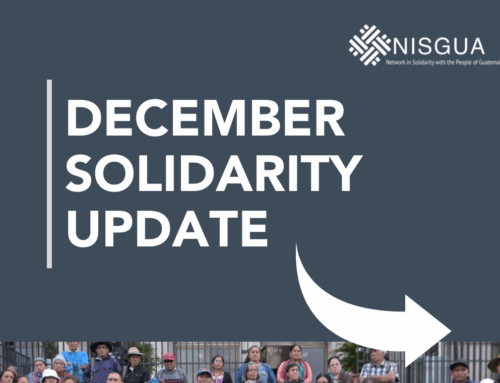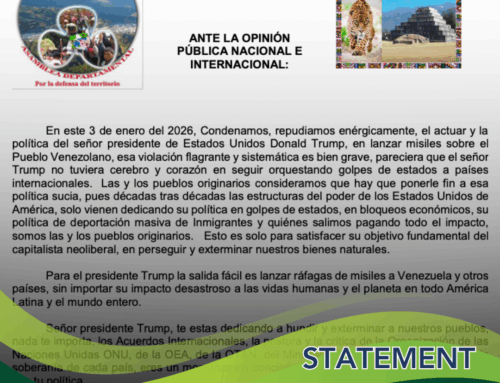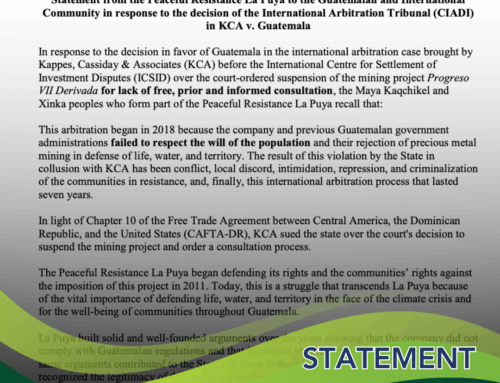News from the Grassroots
- We're ready for 2018 with a new cohort of GAP volunteers!
- NISGUA Local: Building connections between global movements to defend life and territory
Justice & Accountability
- Members of the AJR denounce ongoing racism as they continue their search for justice for genocide
- Plaintiff organizations to take Military Zone 21 case to Constitutional Court to demand survivors' voices be heard
- 500 Years to open in Guatemala this January
Defense of Life & Territory
- Peaceful Resistance continues to call for Escobal mine closure as pressure from Tahoe Resources increases
- Community members in Ixquisís call for protective measures as they commemorate the life of water defender Sebastián Alonso Juan
|
|
|
NISGUA staff David Imhoff and Bridget Brehen welcome our new cohort of international accompaniers Rosemary, Olivia, Meredith and Tal to the NISGUA family. We are grateful for their deep commitment to internationalism and solidarity!
|
|
|
We're ready for 2018 with a new cohort of GAP volunteers!
After building a heartful, connecting, and mutual learning environment together, NISGUA staff and our 4-person cohort of future international human rights accompaniers celebrated the completion of our annual 7-day Guatemala Accompaniment Project training! Participant Olivia Pandolfi reflects, “The chances we had to meet members of the NISGUA family hinted at the kind of lifelong commitments that NISGUA’s collective liberation work inspires and requires.” Read more about GAP, including perspectives from current accompaniers and how to get involved at NISGUA.org/gap.
|
|
NISGUA Local: Building connections between global movements to defend life and territory
A 5,700-year-old Ohlone Shellmound and Village Sacred Site is threatened by a proposed development project in Berkeley, CA on the Ohlone territories where NISGUA’s U.S. office is based. When Ohlone leaders challenged the problematic Draft Environmental Impact Report (DEIR) last year, many of you made the connection to our work in Guatemala, where Environmental Impact Reports are often used to exclude indigenous and campesino communities from the dialogue surrounding what happens on their lands.
Taking action on our indigenous solidarity commitment, the NISGUA network contributed to over 1,700 pages of public comment to the Berkeley Planning Commission. NISGUA’s partners at the Center for International Environmental Law (CIEL) also submitted a formal letter, drawing upon their legal expertise and work in defense of indigenous rights.
One victory resulting from this community outcry was consultation with three bands of local Ohlone peoples previously left out of the process. They unanimously determined they would not accept any building on their sacred site nor engage in negotiations or concessions on one of the few remaining open air sacred sites in the region, stating unequivocally, “Our sacred sites are not for sale.” Read their full statement and a report back from recent NISGUA visits and actions to Save the West Berkeley Shellmound here.
|
|
NISGUA staff participated in the Save West Berkeley Shellmound action as part of the San Francisco Bay Area’s #96hours of resistance to reclaim Dr. Martin Luther King Jr’s radical legacy.
Photo: Brooke Anderson |
|
|
Members of the AJR denounce ongoing racism as they continue their search for justice for genocide
As the retrials against former Guatemalan dictator Ríos Montt and former head of military intelligence Rodríguez Sánchez for genocide advance, survivors organized with the Association for Justice and Reconciliation (AJR) are denouncing ongoing acts of racism in the courtroom. While Ríos Montt is being prosecuted in absentia in a closed-door hearing after being declared medically unfit to stand trial, Rodríguez Sánchez is being tried in a public hearing. Many members of the AJR and their families are attending the public trials to show their solidarity with the more than 80 witnesses who have had to repeat their testimonies - some for the third or fourth time - since the 2013 sentence was overturned.
The AJR’s solidarity with Ixil genocide survivors has been met with further state racism, however. Police have tried to prevent members of the AJR and their allies from entering the public trials, accusing them of intimidation and subjecting them to harassment that no other observers experience. Women who are wearing traje are particularly subject to this police harassment.
Despite this harassment, AJR members continue to collectively hold up the validity of the 2013 sentence, arrive weekly to be present in solidarity, and encourage the involvement of youth in their struggle. They denounce the state’s crimes and its ongoing racism in an attempt to ensure that this same violence never happens again.
|
|

|
|
An Ixil woman prepares to give her testimony in the retrial of Rodríguez Sánchez for genocide. Photo: José Rodríguez
|
|
Plaintiff organizations to take Military Zone 21 case to Constitutional Court to demand survivors' voices be heard
In January 2016, 14 former members of the Guatemalan military were arrested in connection to hundreds of forced disappearances around Military Zone 21 in Cobán, now renamed the Regional Training Command for Peacekeeping Operations (CREOMPAZ). This case has quickly become the largest case of forced disappearance to date in Latin America.
While these important arrests struck a blow against impunity, plaintiff organizations have continued to face obstacles in achieving justice. Judge Claudette Domínguez, who presides over the case, has refused to accept essential military documents as evidence, under the guise of protecting military secrets. These same documents have been accepted by other judges and used as evidence in other important cases, including the Ixil genocide trial. She has also excluded more than 80% of the proposed witnesses put forward by plaintiff organizations, including many witnesses that were set to testify to sexual violence and those who were violently evicted from their lands to make way for the construction of the military base during the conflict.
Now, plaintiffs will be taking their claim to the Guatemalan Constitutional Court on February 1, where they will call for the Court to protect survivors’ rights to share testimony and achieve justice. As they advance, they continue to call for international solidarity. In the words of Aura Elena Farfán, director of FAMDEGUA and one of the plaintiff organizations in the case, “It’s important to have international support. It shows that it’s not just Guatemalans who see and hear the truth, there are many eyes and ears from around the world to hear the truth of what happened.”
|
|
500 Years opens in Guatemala
On January 24, the new Skylight Productions documentary, 500 Years, opened in Quetzaltenango for its Guatemalan debut. The film was featured at the 13th International Indigenous People’s Film Festival and in the coming weeks, will also be screened in Guatemala City, Totonicapán, Nebaj, Salquil Grande, and Cobán.
The film explores more than five centuries of exploitation that indigenous people in Guatemala have survived. It connects the plunder of the Spanish Conquest to the U.S.-funded violence of the internal armed conflict to the ongoing extractive projects imposed on their communities by foreign corporations. It highlights the struggle of two indigenous Guatemalan human rights activists, Irma Alicia Velásquez Nimatuj and Andrea Ixchíu, as they call for justice for genocide, demand accountability for corruption, and defend their territory against further exploitation. The film is the third part in a documentary trilogy that includes When the Mountain Trembles and Granito: How to Nail a Dictator.
|
|
|
NISGUA staff and delegation participants with the Chicago Religious Leadership Network visit members of the Peaceful Resistance outside their camp at the Guatemalan Constitutional Court.
|
|
|
DEFENSE OF LIFE & TERRITORY
|
|
Peaceful Resistance continues to call for Escobal mine closure as pressure from Tahoe Resources increases
On November 30, 2017, members of the Peaceful Resistance of Santa Rosa, Jalapa, and Jutiapa denounced the intense media campaign and lobbying efforts of Tahoe Resources, as the company builds pressure to resume operations at the Escobal mine. Members of the Peaceful Resistance stood in front of the Constitutional Court where they are maintaining a second protest camp to denounce the negative environmental and social impacts of the Escobal mine in their communities and to call on the Constitutional Court to order its permanent closure.
In July 2017, the Supreme Court temporarily suspended the Escobal license until courts determine if the Xinca People’s right to free, prior, and informed consent was violated by granting the license. The case is currently being decided by the Constitutional Court, although the Court has long passed its deadline to render a decision.
Last week, Tahoe issued a press release announcing that the company was laying off 250 local employees as a “natural consequence to the prolonged inaction in the legal system.” Through this announcement, Tahoe seeks to shift blame for regional job instability away from itself to the Court, despite the fact that they knowingly went forward with a project that did not have community support.
Read a statement that members of the Peaceful Resistance shared with NISGUA and a Chicago Religious Leadership Network delegation on a recent visit to their camp on January 8.
|
|
One year later: Community in Huehuetenango honors the life of water defender Sebastián Alonso Juan and calls for an investigation into his murder
One year has passed since Sebastián Alonso Juan - water defender from the community of Yulchen Frontera - was murdered during a peaceful protest near his home in northern Huehuetenango. Sebastián joined other community members on January 17, 2017, in protesting a hydroelectric project owned by Energia y Renovación, formally known as PDH, SA. He was shot when private and state security forces opened fire on protesters and later died from his wounds. On January 1, 2018, community members from Yulchen Frontera honored his memory during a celebration of the new year and a transition of community authority, expressing support for his family who is still waiting for the Public Prosecutor’s office to carry out a thorough investigation and prosecute those responsible.
Former NISGUA accompanier Zia Kandler’s recent article in Upside Down World describes the communities’ struggle to protect their rivers, which would be rerouted towards the dam reservoir and likely contaminated by construction activities.
Hydroelectric dams and mining projects, as well as large-scale agribusiness, are currently threatening communities’ access to clean and sufficient water throughout Huehuetenango. The Departmental Assembly of the Peoples of Huehuetenango (ADH), a grassroots organization that coordinates with representatives from communities across the region, held a press conference on January 20. They expressed their concern for “the management of our waters, which are in danger of privatization, commodification and pollution without a state policy to protect them.” They call on the Guatemalan state to fulfill its role as guarantor of the human rights to water and ask communities to remain alert to national policies that threaten their water sources. Read NISGUA’s translation of the full statement here. |
|
|
|











Leave A Comment